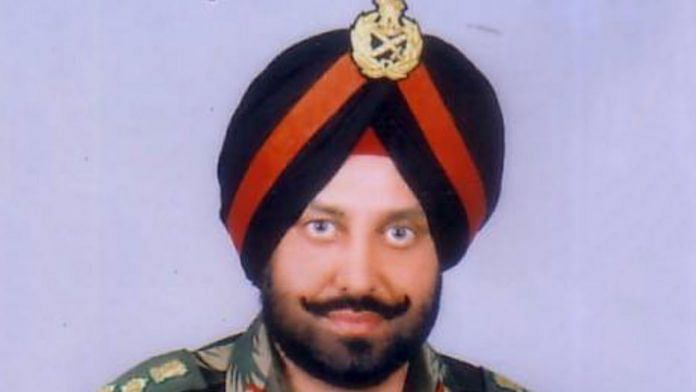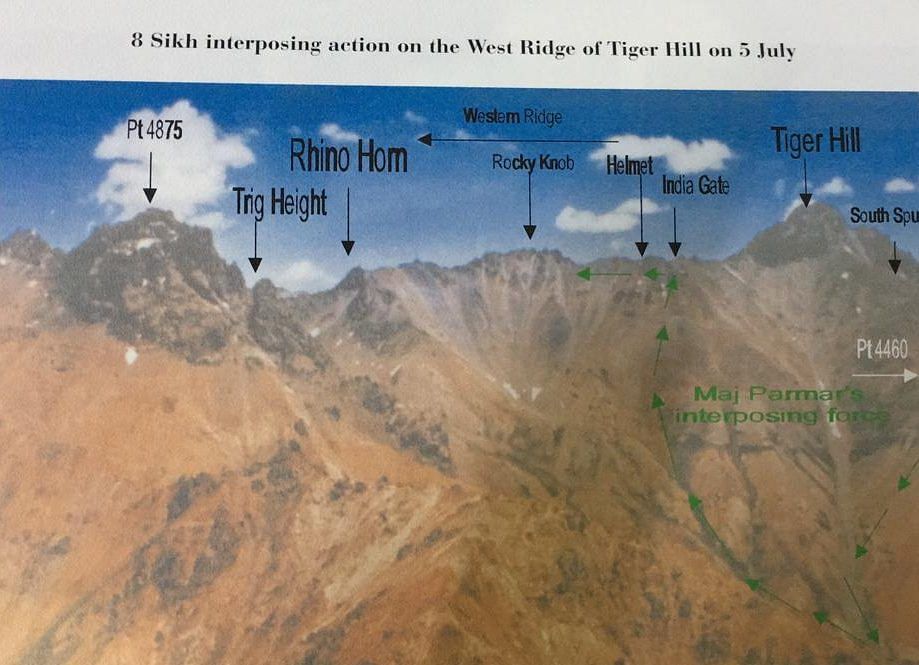New Delhi: Opposing soldiers in wars often earn respect from the other side because of their sheer determination and bravery. In the 1999 Kargil conflict between India and Pakistan, one such officer was Pakistan Army Captain Karnal Sher Khan.
Captain Khan, who was killed in action, was initially abandoned by his country when it refused to acknowledge that its army personnel had been involved, but eventually received Pakistan’s highest gallantry award, the Nishan-e-Haider. And this honour was made possible by an Indian Army officer, Brigadier M.P.S. Bajwa (now retired), who was then commanding the 192 Mountain Brigade.
Bajwa was so impressed by the way Khan had fought that he wrote a citation for him and placed it in his pocket while handing over the body, which eventually led to his recognition.
Also read: These 5 Indian Army, IAF heroes are the faces of the Kargil conflict
The battle of Tiger Hill
Speaking to ThePrint, Brig. Bajwa said his brigade was tasked with capturing the strategically-important Tiger Hill. He delegated the responsibility to 18 Grenadiers — which was earlier involved in the battle of Tololing and had suffered approximately 60 casualties — and 8th battalion Sikh Regiment (8 Sikh), which was already in the firm base around Tiger Hill and had lost approximately 25 men in earlier skirmishes.
“I tasked 18 Grenadiers with capturing Tiger Hill Top with their Ghatak Platoon and other companies from the south-west and east. I had warned the commanding officer of 8 Sikh to keep around 50 personnel with two officers ready to be launched on the south-western ridge line to prevent any reinforcements/counter-attack on Tiger Hill Top,” he said.
On 4 July 1999, the Ghatak Platoon headed by Captain Balwan Singh of 18 Grenadiers managed to capture the Tiger Hill Top, but the battle was still going on, with other troops of 18 Grenadiers being rushed to support the platoon.
“Meanwhile, apprehending a likely counter-attack from the south-western ridge line, I ordered 8 Sikh, comprising of 52 personnel — two officers, four junior commissioned officers (JCOs) and 46 soldiers — to capture (the features code-named) ‘India Gate’ and ‘Helmet’,” he said.
“To avoid observation in daylight and the enemy’s intense artillery and other fire, 8 Sikh followed a dry nala and were in position after capturing two enemy posts by first light of 5 July.”
Also read: At IAF’s Gwalior base, Mirages attack ‘Tiger Hill’ to celebrate 20 years of Kargil success
Khan leads a counter-attack
Radio intercepts also indicated likely counter-attack any time. Bajwa said that at around 6.45 the next morning, the first counter-attack was made by a weak platoon of 20 men, which 8 Sikh beat back.
“But subsequently, a fierce attack led by two Pakistani officers (later identified as Captain Khan of the 12 Northern Light Infantry and Major Iqbal of the Special Service Group) killed three JCOs,” Bajwa said, adding that the attack was supported by artillery fire.
This forced the rest of the Indian soldiers to withdraw to another location.
“At one time, a situation arose wherein we had both our officers wounded, with three and 15 soldiers dead, besides 18 soldiers injured,” he said.
At this point, Brig. Bajwa spoke to the forward-most solider, Sepoy Satpal Singh, and came to know that Captain Khan, who was leading the attack, was time and again motivating the remaining troops to press on. He realised that it was important to take down the Pakistani officer, and so directions were issued.
Sepoy Singh and two other soldiers managed to kill three leading Pakistani soldiers, and shot Captain Khan from 10 yards.
“The battle of Tiger Hill was thus won. We buried 30 enemy dead. I, thereafter, through civilian porters, got Captain Khan’s body down from Tiger Hill. After a search, we found letters written by his wife in Urdu. The Captain had really fought bravely,” Bajwa said.

Before dispatching the body to Delhi, he informed his General Officer Commanding of Khan’s bravery and expressed the desire to write a small letter of appreciation and citation — that Captain Khan had fought very bravely and must be given his due recognition.
“A piece of paper with a hand-written citation was placed in his pocket. Initially, Pakistan refused to take his body, saying that their soldiers had never fought, but later the body was accepted,” Bajwa said.
“It was heartening news that he was awarded the Nishan-e-Haider. I received a letter of thanks to the Indian Army from his father.”
Also read: How Indian Army’s valour and Vajpayee’s diplomacy won the Kargil War for India





He was born on 1 January 1970. He was commissioned in 27th Sind Regiment on 14 October 1994. Captain Karnal Sher Khan emerged as the symbol of mettle and courage during the Kargil conflict at the Line of Control. He set up personal examples of bravery and inflicted heavy losses on the enemy. He defended five strategic posts, which he established with his soldiers at the height of 17,000 feet in Gultary area. On 5 July 1999, Indians, with the help of two battalions, managed to capture some portion of one of his post. Despite facing all odds, he led a counter-attack and re-captured the lost portion. Captain Karnal Sher Khan also chased the enemy and conducted many raids in enemy area. During one of such raid, he went inside enemy camp where he inflicted heavy losses. During the battle he received burst of fire in the chest and embraced ‘SHAHADAT’.
Is it fact that any indian soldier helped Pakistani army to come over the tiger hill ????
Proud of Gentlemen soldiers like Brig Bajwa
Amazing story of valour (Khan), integrity (Brig. Bajwa) and malevolence (Pakistani establishment).
RR cheap talk of malevolence when you look at your armed forces in Indian Occupied Kashmir. Pakistan Zindabad, Kernal Sher Khan Paindabad!
Your Illiterate Hypocrite madrassachap jaahil ot dont understand the language of respect,integryt do you?no doubt karnal fought bravely(as ind army said so who hvlave 100 times more Integrity then your cowars, surrendering, propaganda spreading nutjobs)but like all other thousands of Pak soldiers his death was futile/fruitless as they failed in their ambitions,as they always have in all wars/conflicts with India, if you are really sorry for Sher Kahn death,go & give tight slap to that idiot monkey face musharraf who brought you defeat & HUMILIATION.
Your Illiterate Hypocrite madrassachap jaahil lot don’t understand the language of respect do you??no doubt karnal sher fought bravely which was even attested by Indian army(the same army which showed its big heart by sparing lives of 90,000+ Pak soldiers when it begged it onto feet after surrendering),but his & thousands of other Pak soldiers death was futile as they failed in their military/strategical ambition as they have in all ind-pak wars & conflicts,if you are really sorry/angry for your soldiers death,go slap your monkey face musharaff who brought defeat/HUMILIATION to you in 1st place.